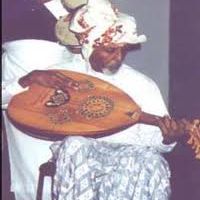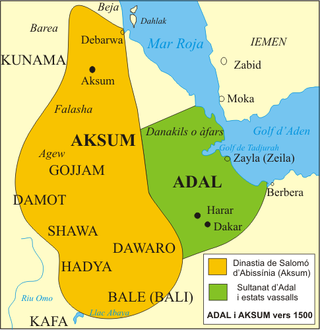Related Research Articles

The Music of the Somali people is music following the musical styles, techniques and sounds of the Somali people.

The Isaaq is a major Somali clan. It is one of the largest Somali clan families in the Horn of Africa, with a large and densely populated traditional territory.

Mohamed Abdi Hashi was a Somali politician, who served as the president of USP during the 1990s. He hailed from the Dhulbahante clan, Qayaad sub clan.

The Dir is one of the largest and most prominent Somali clans in the Horn of Africa. They are also considered to be the oldest Somali stock to have inhabited the region. Its members inhabit Djibouti, Somalia, Ethiopia, and northeastern Kenya.

The Gadabuursi, also known as Samaroon, is a northern Somali clan, a sub-division of the Dir clan family.

Barawa, also known as Barawe and Brava, is the capital of the South West State of Somalia. It functions as a port town in the southwestern Lower Shebelle region of Somalia. Facing the Indian Ocean, Barawa serves as the main port of the South West State.
Aw Jama Omar Issa commonly known as Aw Jaamac, was a Somali scholar, historian and collector of oral literature of Somalia. He wrote the first authoritative study of Dervishes, the polity of monarch Diiriye Guure.
Over the course of the Somali Civil War, there have been many revolutionary movements and militia groups run by competing rebel leaders which have held de facto control over vast areas within Somalia.

Somali literature is the literature used by the ethnic Somalis of Somalia, Somaliland, Djibouti, Yemen, Eritrea, Ogadenia, and Kenya.
Abdillahi Suldaan Mohammed, known as Timacade, was a Somali poet. He was one of the most prominent bards of his day.
Abdi Sinimo was a Somali singer, songwriter, poet and musical innovator. He is noted for having established the Balwo genre of Somali music, which was the forerunner of the Heelo genre and thus gave birth to modern Somali music.

Somali studies is the scholarly term for research concerning Somalis and Greater Somalia. It consists of several disciplines such as anthropology, sociology, linguistics, historiography and archaeology. The field draws from old Somali chronicles, records and oral literature, in addition to written accounts and traditions about Somalis from explorers and geographers in the Horn of Africa and the Middle East. The Somali Studies International Association is the primary organization for Somalist scholars. Bildhaan, Somali Studies, Horn of Africa and the Anglo-Somali Society Journal likewise serve as the field's main periodicals. Since 1980, prominent Somalist scholars from around the world have also gathered annually to hold the International Congress of Somali Studies.

Abdullahi Qarshe (1924–1994) was a Somali musician, poet and playwright known as the "Father of Somali music". In 1957 he wrote and composed the Somali National Anthem, Qolobaa Calankeed.
Hassan Sheikh Mumin was a Somali poet, playwright, broadcaster, actor and composer.
Ughaz Nur II' or Ugas NurII' also known as UghazNur Robleh, was a Somali King and poet of the Gadabuursi clan.
Elmi Boodhari was a Somali poet and pioneer in the genre of Somali love poems. He is known among Somalis as the King of Romance. He was born near the border between Ethiopia and Somaliland in 1908 and hailed from the Eidagale sub-clan.
Ughaz 'Elmi Roble Warfa or Ughaz 'Elmi Roble Warfa also known as 'Elmi Warfa was a Gadabursi King. his other nicknames were 'Elmi Dheire "'Elmi the Tall", because he was a very tall man and Kun ‘Iil " which means A Thousand Sorrows",

Radio Hargeisa is a Somaliland public service broadcaster, Its headquarters are at Ministry of Information, Hargeisa.

The Gadabuursi Ughazate or Ugasate evolved from and was a successor kingdom to the Adal Sultanate and Sultanate of Harar. The first Ughaz (Ugaas) of this successor kingdom, Ali Makail Dera was the son of Makail Dera, the progenitor of the Makayl-Dheere. During the late 19th century, as the region became subject to colonial rule, the Ughaz assumed a more traditional and ceremonial leadership of the clan. The Gadabuursi give their King the title of Ughaz. It's an authentic Somali term for King or Sultan. The Gadabuursi in particular are one of the clans with a long tradition of the institution of Sultan.
References
- ↑ Johnson, John William (1996). Heelloy: Modern Poetry and Songs of the Somali. Indiana University Press. ISBN 978-1874209812.
- ↑ Mukhtar, Muhammad Haji (2003-02-25). Historical dictionary of Somalia. Scarecrow Press. p. 12. ISBN 9780810866041.
- ↑ Mukhtar, Muhammad Haji (2000). Historical dictionary of Djibouti. Scarecrow Press. p. 2. ISBN 9780810838734.
- ↑ African Language Review, Volume 6. The University of Michigan: F. Cass. 1967. p. 5.
- ↑ Andrzejewski, B. W.; Pilaszewicz, S.; Tyloch, W. (1985-11-21). Literatures in African Languages: Theoretical Issues and Sample Surveys. Cambridge University Press. ISBN 9780521256469.
Cabdi Deeqsi, who created a genre of love poetry called Balwo
- 1 2 Johnson, John William (1996). Heelloy: Modern Poetry and Songs of the Somali. Indiana University Press. p. 100. ISBN 978-1874209812.
- ↑ Mukhtar, Mohamed Haji (2003-02-25). Historical Dictionary of Somalia. Scarecrow Press. ISBN 9780810866041.
- ↑ AFRICA DIARY: A WEEKLY RECORD OF EVENTS IN AFRICA. South Africa: Africa Publications (India). 1964. p. 4.
- ↑ Stovel, Nora Foster (2008-08-19). Divining Margaret Laurence: A Study of Her Complete Writings. McGill-Queen's Press - MQUP. ISBN 9780773533769.
- ↑ Brinkhurst, Emma (2012). Music, Memory and Belonging: Oral Tradition and Archival Engagement Among the Somali Community of London's King's Cross. University of London. p. 61.
- ↑ "Interview with the late Abdullahi Qarshe (1994) at the Residence of Obliqe Carton in Djibouti". Macalester College. 1994. p. 80.
- 1 2 Mukhtar, Mohamed Haji (2003-02-25). Historical Dictionary of Somalia. Scarecrow Press. p. 12. ISBN 9780810866041.
- ↑ Historical Dictionary of Somalia, 2003
- ↑ Finnegan, Ruth (2012), "Lyric", Oral Literature in Africa, World Oral Literature Series, vol. 1, Open Book Publishers, pp. 235–263, doi: 10.11647/obp.0025.09 , ISBN 9781906924706
- ↑ Andrzejewski, B.W.; Lewis, I.M.; O'Fahey, R.S. (1994). "New Arabic Documents from Somalia". Sudanic Africa. 5: 39–56. ISSN 0803-0685. JSTOR 25653242.